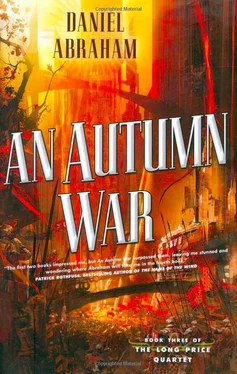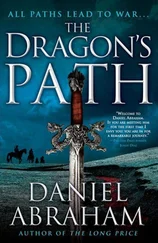Daniel Abraham - Autumn War
Здесь есть возможность читать онлайн «Daniel Abraham - Autumn War» весь текст электронной книги совершенно бесплатно (целиком полную версию без сокращений). В некоторых случаях можно слушать аудио, скачать через торрент в формате fb2 и присутствует краткое содержание. Жанр: Фэнтези, на английском языке. Описание произведения, (предисловие) а так же отзывы посетителей доступны на портале библиотеки ЛибКат.
- Название:Autumn War
- Автор:
- Жанр:
- Год:неизвестен
- ISBN:нет данных
- Рейтинг книги:4 / 5. Голосов: 1
-
Избранное:Добавить в избранное
- Отзывы:
-
Ваша оценка:
- 80
- 1
- 2
- 3
- 4
- 5
Autumn War: краткое содержание, описание и аннотация
Предлагаем к чтению аннотацию, описание, краткое содержание или предисловие (зависит от того, что написал сам автор книги «Autumn War»). Если вы не нашли необходимую информацию о книге — напишите в комментариях, мы постараемся отыскать её.
Autumn War — читать онлайн бесплатно полную книгу (весь текст) целиком
Ниже представлен текст книги, разбитый по страницам. Система сохранения места последней прочитанной страницы, позволяет с удобством читать онлайн бесплатно книгу «Autumn War», без необходимости каждый раз заново искать на чём Вы остановились. Поставьте закладку, и сможете в любой момент перейти на страницу, на которой закончили чтение.
Интервал:
Закладка:
"I can't promise you what the Council will do. Especially once… if…"
"Promise me you won't. You and your men. I'll worry about the others later."
There was strength in the man's voice. And sorrow. Balasar thought of all the things he knew of this man, all the things Sinja had told him. A seafront laborer, a sailor, a courier, an assistant midwife. And now a man who negotiated the fate of the world over a meeting table in a snow-packed square while thousands of soldiers who'd spent the previous day trying to kill one another looked on. He was unremarkableexhausted, grieving, determined. He could have been anyone.
"I'll need to talk to my men," Balasar said.
"Of course."
"I'll have an answer for you by sundown."
"If you have it by midday, we can get you someplace warm before night."
"Midday, then."
They rose together, Balasar taking a pose of respect, and the Emperor Otah Machi returning it.
"General," Otah said as Balasar began to turn away. His voice was gray as ashes. "One thing. You came because you believed the andat were too powerful, and the poet's hearts were too weak. You weren't wrong. The man who did this was a friend of mine. He's a good man. Good men shouldn't be able to make mistakes with prices this high."
Balasar nodded and walked hack across the square. The drummers matched the pace of his steps. The last of the hooks burned, the last of the poets fled into the wilderness, most likely to die, and if not then to live outcast for their crimes. The andat gone from the world. It was hard to think it. All his life he had aimed for that end, and still the idea was too large. His captains crowded around him as he drew near. "Their faces were ashen and excited and fearful. Questions battered at him like moths at a lantern.
"'Ieil the men," Balasar began, and they quieted. Balasar hesitated. "Tell the men to disarm. We'll bring the weapons here. By midday."
"There was a moment of profound silence, and then one of the junior captains spoke.
"How should we explain the surrender, sir?"
Balasar looked at the man, at all his men. For the first time in his memory, there seemed to be no ghosts at his back. He forced himself not to smile.
"Tell them we won."
27
The mine was ancient-one of the first to be dug when Machi had been a new city, the last Empire still unfallen. Its passages honeycombed the rock, twisting and swirling to follow veins of ore gone since long before Maati's great-grandfather was born. Together, Maati and Cehmai had been raiding the bolt-hole that Otah had prepared for them and for his own children. It had been well stocked: dried meat and fruit, thick crackers, nuts and seeds. All of it was kept safe in thick clay jars with wax seals. They also took the wood and coal that had been set by. It would have been easier to stay there-to sleep in the beds that had been laid out, to light the lanterns set in the stone walls. But then they might have been found, and without discussing it, they had agreed to flee farther away from the city and the people they had known. Cehmai knew the tunnels well enough to find a new hiding place where the ventilation was good. They weren't in danger of the fire igniting the mine air, as had sometimes happened. Or of the flames suffocating them.
The only thing they didn't have in quantity was water; that, they could harvest. MMlaati or Cehmai could take one of the mine sleds out, fill it with snow, and haul it down into the earth. A trip every day or two was sufficient. They took turns sitting at the brazier, scooping handful after handful of snow into the flat iron pans, watching the perfect white collapse on itself and vanish into the black of the iron.
"We did what we could," Maati said. "It isn't as if we could have done anything differently."
"I know," Cehmai said, settling deeper into his cloak.
The rough stone walls didn't make their voices echo so much as sound hollow.
"I couldn't just let the Galts roll through the city. I had to try," Maati said.
"We all agreed," Cehmai said. "It was a decision we all reached together. It's not your fault. Let it go."
It was the conversation Maati always returned to in the handful of days they'd spent in hiding. He couldn't help it. He could start with plans for the spring-taking gold and gems from the bolt-hole and marching off to Eddensea or the Westlands. He could start with speculations on what was happening in Machi or reminiscences of his childhood, or what sort of drum fit best with which type of court dance. He could begin anywhere, and he found himself always coming hack to the same series of justifications, and Cehmai agreeing by rote with each of them. The dark season spread out before them-only one another for company and only one conversation spoken over and over, its variations meaningless. Maati took another handful of snow and dropped it into the iron melting pan.
"I've always wanted to go to Bakta," Cehmai said. "1 hear it's warm all year."
"I've heard that too."
"Maybe next winter," Cehmai said.
"Maybe," Maati agreed. "I'he last icy island of snow melted and vanished. Maati dropped another handful in.
"What part of the day is it, do you think?" Nlaati asked.
"After morning, I'd think. Maybe a hand or two either side of midday."
"You think so? I'd have thought later."
"Could be later," Cehmai said. "I lose track down here."
"I'm going to the bolt-hole again. Get more supplies."
They didn't need them, but Cehmai only raised his hands in a pose of agreement, then curled into himself and shut his eyes. Maati pulled the thick leather straps of the sled harness over his shoulders, lit a lantern, and began the long walk through the starless dark. The wood and metal flat-bottomed sled scraped and ground along the stone and dust of the mine floor. It was light now. It would be heavier coming hack. But at least \laati was alone for a time, and the effort of pulling kept his mind clear.
An instrument of slaughter, made in fear. Sterile had called herself that. Maati could still hear her voice, could still feel the bite of her words. He had destroyed Galt, but he had destroyed his own people as well. He'd failed, and every doubt he had ever had of his own ability, or his worthiness to be among the poets, stood justified. He would he the most hated man in generations. And he'd earned it. The sled dragging behind him, the straps pulling hack at his shoulders-they were the simplest burden he carried. They were nothing.
Cehmai had marked the turnings to take with piles of stone. Hunters searching the mines would be unlikely to notice the marks, but they were easy enough for Maati to follow. He turned left at a crossing, and then bore right where the tunnel forked, one passage leading up into darkness, the other down into air just as black.
The only comfort that the andat had offered-the only faint sliver of grace-was that Maati was not wholly at fault. Otah-kvo bore some measure of this guilt as well. fie was the one who had come to Ntaati, all those years ago. He was the one who had hinted to Maati that the school to which they had both been sent had a hidden structure. If he hadn't, Maati might never have been a poet. Never have known Seedless or Heshai, Liat or Cehmai. Nayiit might never have been born. Even if the Galts had come, even if the world had fallen, it wouldn't have fallen on Maati's shoulders. Cehmai was right; the binding of Sterile had been a decision they had all made-Otah-kvo more than any of the rest. But it was Maati who was cast out to live in the dark and the cold. The sense of betrayal was as comforting as a candle in the darkness, and as he walked, Maati found himself indulging it.
The fault wasn't his alone, and the punishment was. There was nothing fair in that. Nothing right. The terrible thing that had happened seemed nearly inevitable now that he looked back on it. He'd been given hardly any hooks, not half the time he'd been promised, and the threat of death at the end of a Galtic sword unless he succeeded. It would have been astounding it he hadn't failed.
Читать дальшеИнтервал:
Закладка:
Похожие книги на «Autumn War»
Представляем Вашему вниманию похожие книги на «Autumn War» списком для выбора. Мы отобрали схожую по названию и смыслу литературу в надежде предоставить читателям больше вариантов отыскать новые, интересные, ещё непрочитанные произведения.
Обсуждение, отзывы о книге «Autumn War» и просто собственные мнения читателей. Оставьте ваши комментарии, напишите, что Вы думаете о произведении, его смысле или главных героях. Укажите что конкретно понравилось, а что нет, и почему Вы так считаете.










